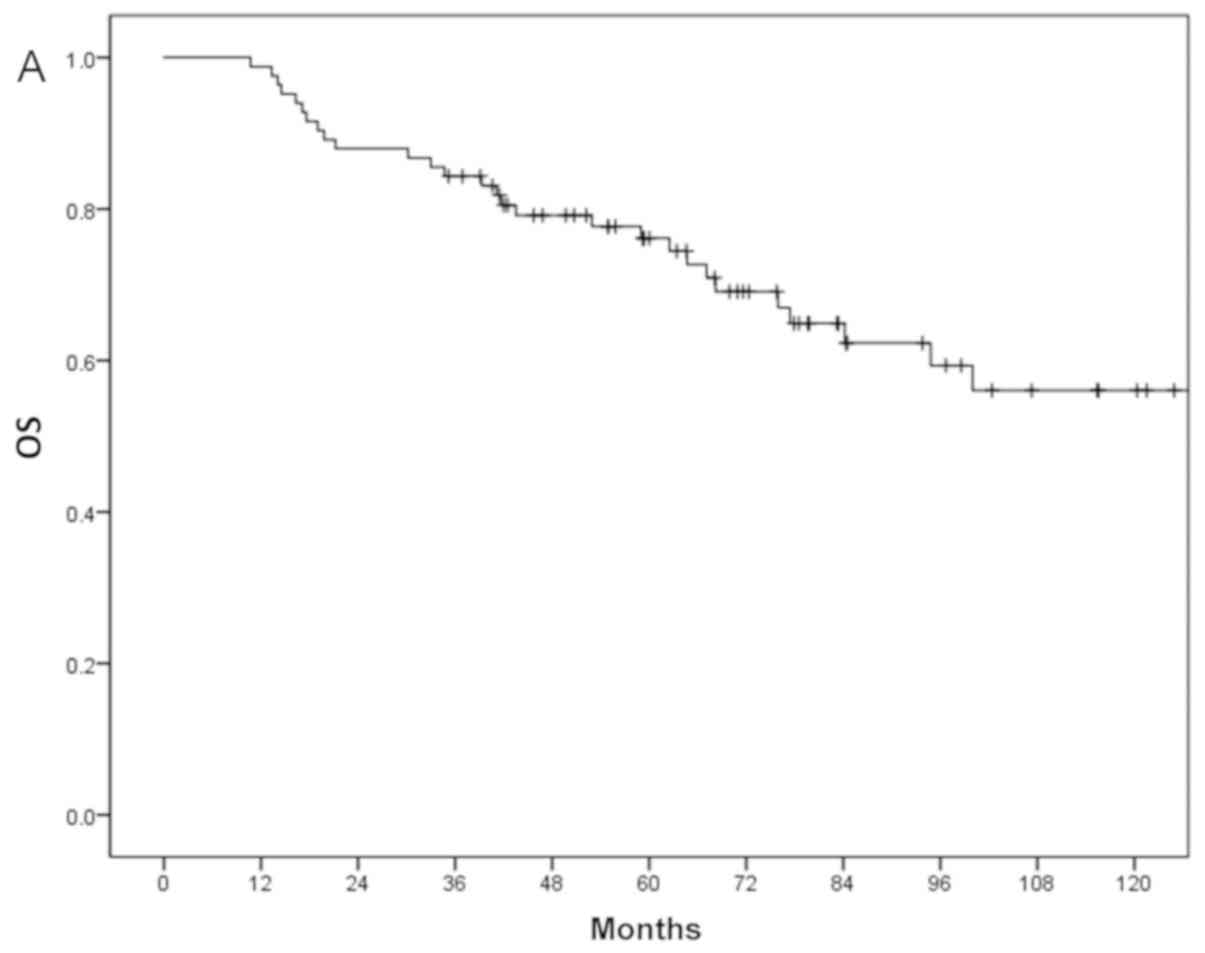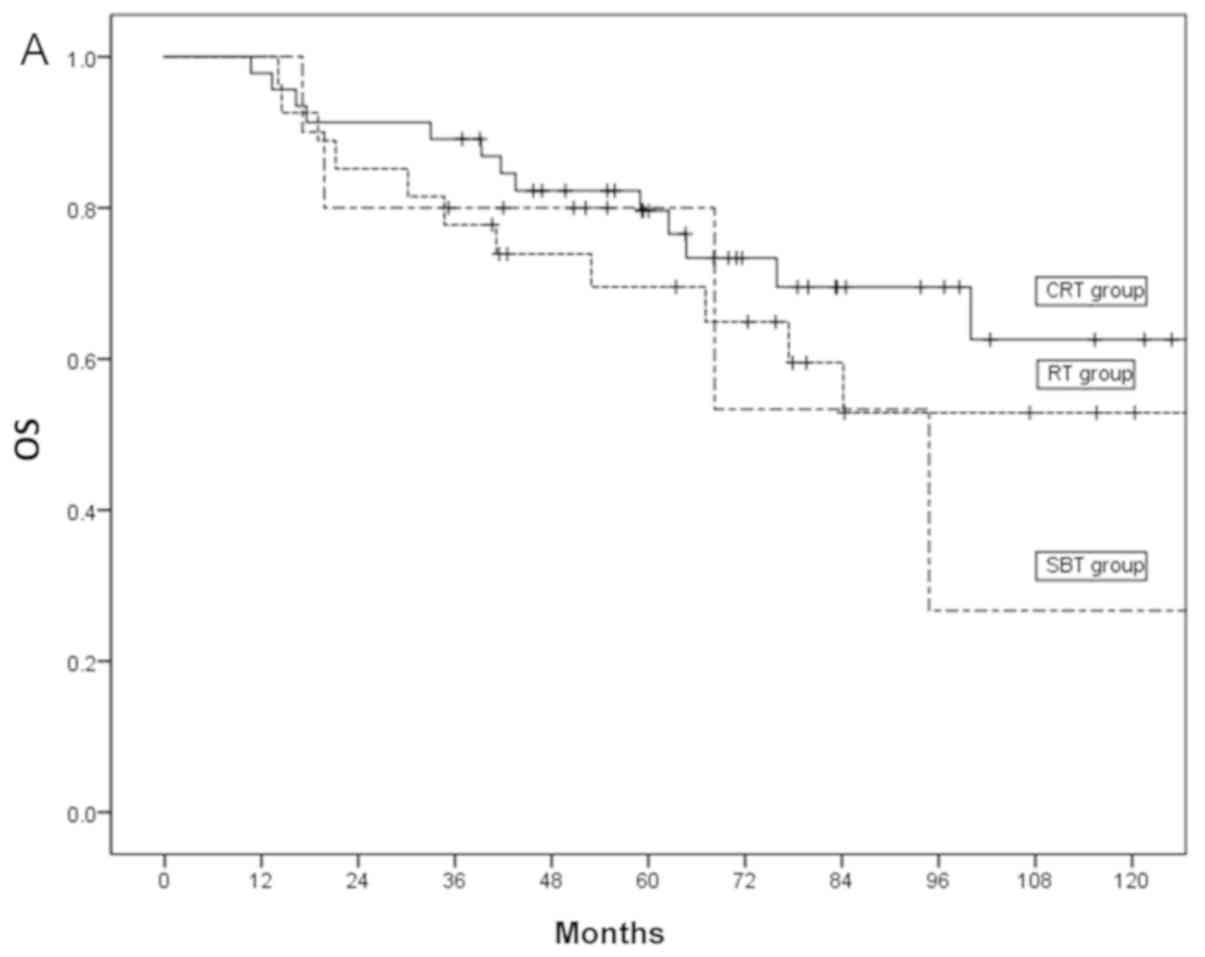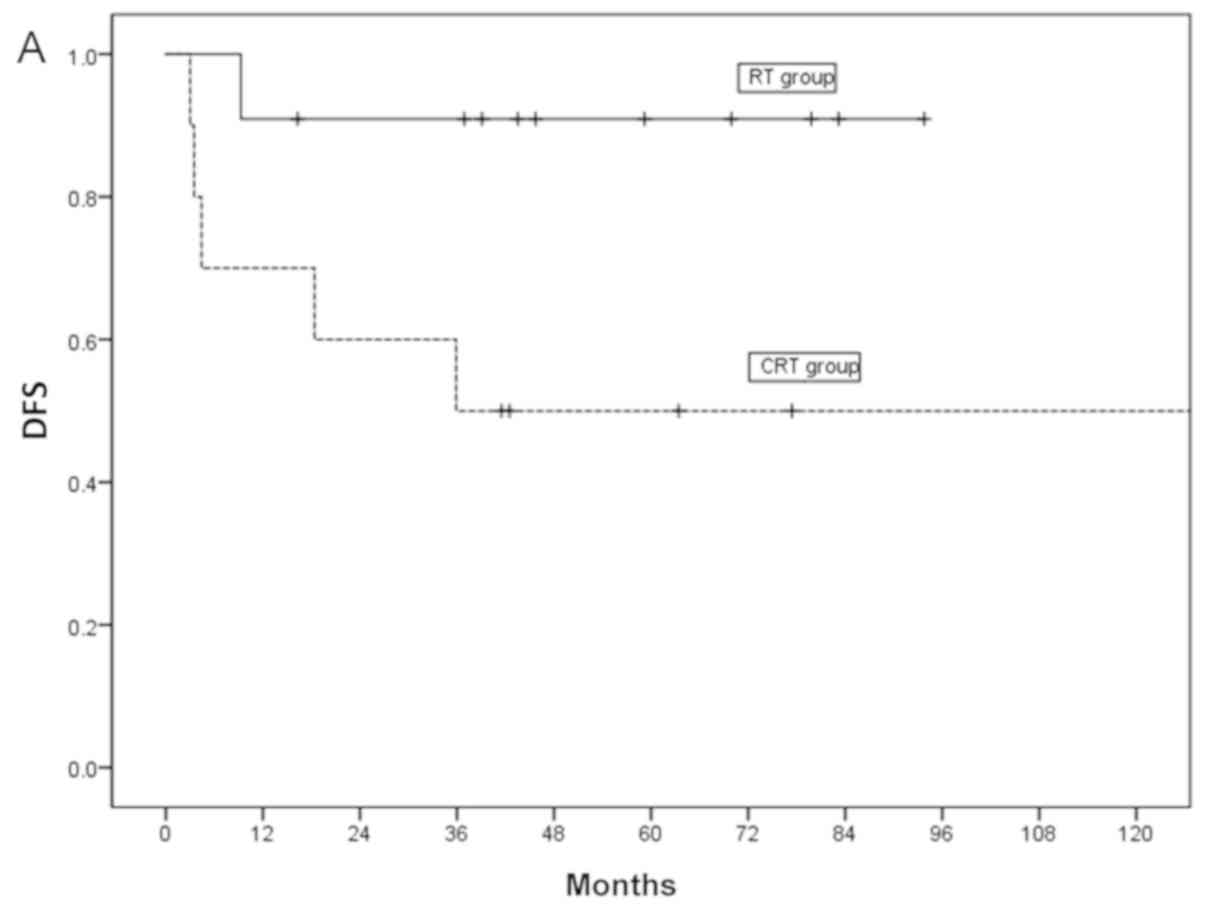|
1
|
Siegel R, Naishadham D and Jemal A: Cancer
statistics, 2013. CA Cancer J Clin. 63:11–30. 2013. View Article : Google Scholar : PubMed/NCBI
|
|
2
|
Groome PA, O'Sullivan B, Irish JC,
Rothwell DM, Schulze K, Warde PR, Schneider KM, Mackenzie RG,
Hodson DI, Hammond JA, et al: Management and outcome differences in
supraglottic cancer between Ontario, Canada, and the Surveillance,
Epidemiology, and End Results areas of the United States. J Clin
Oncol. 21:496–505. 2003. View Article : Google Scholar : PubMed/NCBI
|
|
3
|
Mendenhall WM, Werning JW, Hinerman RW,
Amdur RJ and Villaret DB: Management of T1-T2 Glottic carcinomas.
Cancer. 100:1786–1792. 2004. View Article : Google Scholar : PubMed/NCBI
|
|
4
|
Pfister DG, Spencer S, Adelstein D, Adkins
D, Brizel DM, Burtness B, Busse PM, Caudell JJ, Cmelak AJ, Colevas
AD, et al: National Comprehensive Cancer Network: NCCN Clinical
Practice Guidelines in Oncology (NCCN Guidelines) Head and Neck
Cancers (Version 1). 2020.https://www.nccn.orgApril 07–2020
|
|
5
|
Feng Y, Wang B and Wen S: Laser surgery
versus radiotherapy for T1-T2N0 glottic cancer: A meta-analysis.
ORL J Otorhinolaryngol Relat Spec. 73:336–342. 2011. View Article : Google Scholar : PubMed/NCBI
|
|
6
|
Yoo J, Lacchetti C, Hammond JA and Gilbert
RW; Head; Neck Cancer Disease Site Group, : Role of endolaryngeal
surgery (with or without laser) versus radiotherapy in the
management of early (T1) glottic cancer: A systematic review. Head
Neck. 36:1807–1819. 2014. View Article : Google Scholar : PubMed/NCBI
|
|
7
|
Akimoto T, Nonaka T, Kitamoto Y, Ishikawa
H, Ninomiya H, Chikamatsu K, Furuya N, Hayakawa K, Mitsuhashi N and
Nakano T: Radiation therapy for T2N0 laryngeal cancer: A
retrospective analysis for the impact of concurrent chemotherapy on
local control. Int J Radiat Oncol Biol Phys. 64:995–1001. 2006.
View Article : Google Scholar : PubMed/NCBI
|
|
8
|
Laccourreye O, Weinstein G, Brasnu D,
Trotoux J and Laccourreye H: Vertical partial laryngectomy: A
critical analysis of local recurrence. Ann Otol Rhinol Laryngol.
100:68–71. 1991. View Article : Google Scholar : PubMed/NCBI
|
|
9
|
Brumund KT, Gutierrez-Fonseca R, Garcia D,
Babin E, Hans S and Laccourreye O: Frontolateral vertical partial
laryngectomy without tracheotomy for invasive squamous cell
carcinoma of the true vocal cord: A 25-year experience. Ann Otol
Rhinol Laryngol. 114:314–322. 2005. View Article : Google Scholar : PubMed/NCBI
|
|
10
|
Furusaka T, Matuda H, Saito T, Katsura Y
and Ikeda M: Long-term observations and salvage operations on
patients with T2N0M0 squamous cell carcinoma of the glottic larynx
treated with radiation therapy alone. Acta Otolaryngol.
132:546–551. 2012. View Article : Google Scholar : PubMed/NCBI
|
|
11
|
Arshad H, Jayaprakash V, Gupta V, Cohan
DM, Ambujakshan D, Rigual NR, Singh AK and Hicks WL Jr: Survival
differences between organ preservation surgery and definitive
radiotherapy in early supraglottic squamous cell carcinoma.
Otolaryngol Head Neck Surg. 150:237–244. 2014. View Article : Google Scholar : PubMed/NCBI
|
|
12
|
Furusaka T, Matsuda A, Saito T, Katsura Y
and Ikeda M: Concurrent chemoradiation therapy with docetaxel (DOC)
for laryngeal preservation in T2N0M0 glottic squamous cell
carcinomas. Acta Otolaryngol. 133:99–112. 2013. View Article : Google Scholar : PubMed/NCBI
|
|
13
|
Nishimura G, Tsukuda M, Mikami Y, Matsuda
H, Horiuchi C, Taguchi T, Takahashi M, Kawakami M, Watanabe M, Niho
T, et al: Efficacy of concurrent chemoradiotherapy for T1 and T2
laryngeal squamous cell carcinoma regarding organ preservation.
Anticancer Res. 29:661–666. 2009.PubMed/NCBI
|
|
14
|
American Society of Clinical Oncology, .
Pfister DG, Laurie SA, Weinstein GS, Mendenhall WM, Adelstein DJ,
Ang KK, Clayman GL, Fisher SG, Forastiere AA, et al: American
society of clinical oncology clinical practice guideline for the
use of larynx-preservation strategies in the treatment of laryngeal
cancer. J Clin Oncol. 24:3693–3704. 2006. View Article : Google Scholar : PubMed/NCBI
|
|
15
|
Urba S, Wolf G, Eisbruch A, Worden F, Lee
J, Bradford C, Teknos T, Chepeha D, Prince M, Hogikyan N and Taylor
J: Single-cycle induction chemotherapy selects patients with
advanced laryngeal cancer for combined chemoradiation: A new
treatment paradigm. J Clin Oncol. 24:593–598. 2006. View Article : Google Scholar : PubMed/NCBI
|
|
16
|
Lefebvre JL: Laryngeal preservation in
head and neck cancer: Multidisciplinary approach. Lancet Oncol.
7:747–755. 2006. View Article : Google Scholar : PubMed/NCBI
|
|
17
|
Forastiere AA, Zhang Q, Weber RS, Maor MH,
Goepfert H, Pajak TF, Morrison W, Glisson B, Trotti A, Ridge JA, et
al: Long-term results of RTOG 91–11: A comparison of three
nonsurgical treatment strategies to preserve the larynx in patients
with locally advanced larynx cancer. J Clin Oncol. 31:845–852.
2013. View Article : Google Scholar : PubMed/NCBI
|
|
18
|
Pignon JP, le Maître A, Maillard E and
Bourhis J; MACH-NC Collaborative Group, : Meta-analysis of
chemotherapy in head and neck cancer (MACH-NC): An update on 93
randomised trials and 17,346 patients. Radiother Oncol. 92:4–14.
2009. View Article : Google Scholar : PubMed/NCBI
|
|
19
|
Amin MB, Edge S, Greene F, Byrd DR,
Brookland RK, Washington MK, Gershenwald JE, Compton CC, Hess KR,
Sullivan DC, et al: AJCC Cancer Staging Manual. 8th. Springer; New
York, NY: 2017, View Article : Google Scholar
|
|
20
|
Korean Society of Thyroid-Head and Neck
Surgery Guideline Task Force, . Ahn SH, Hong HJ, Kwon SY, Kwon KH,
Roh JL, Ryu J, Park JH, Baek SK, Lee GH, et al: Guidelines for the
surgical management of laryngeal cancer: Korean society of
thyroid-head and neck surgery. Clin Exp Otorhinolaryngol. 10:1–43.
2017. View Article : Google Scholar : PubMed/NCBI
|
|
21
|
Forastiere AA, Ismaila N, Lewin JS, Nathan
CA, Adelstein DJ, Eisbruch A, Fass G, Fisher SG, Laurie SA, Le QT,
et al: Use of Larynx-Preservation strategies in the treatment of
laryngeal cancer: American society of clinical oncology clinical
practice guideline update. J Clin Oncol. 36:1143–1169. 2018.
View Article : Google Scholar : PubMed/NCBI
|
|
22
|
Shanei A, Abedi I, Saadatmand P,
Amouheidari AR and Akbari-Zadeh H: Comparison of 3D conformal and
intensity modulated radiotherapy in early stage oral tongue cancer:
Dosimetric and radiobiological evaluation. Int J Radiat Res.
18:33–42. 2020.
|
|
23
|
US Department of Health and Human
Services; National Institutes of Health; National Cancer Institute,
. Common Terminology Criteria For Adverse Events (CTCAE), Version
5.0. November 27–2017.
|
|
24
|
Jones TM, De M, Foran B, Harrington K and
Mortimore S: Laryngeal cancer: United Kingdom National
Multidisciplinary guidelines. J Laryngol Otol. 130:S75–S82. 2016.
View Article : Google Scholar : PubMed/NCBI
|
|
25
|
Hirasawa N, Itoh Y, Ishihara S, Kubota S,
Itoh J, Fujimoto Y, Nakashima T and Naganawa S: Radiotherapy with
or without chemotherapy for patients with T1-T2 glottic carcinoma:
Retrospective analysis. Head Neck Oncol. 2:202010. View Article : Google Scholar : PubMed/NCBI
|
|
26
|
Mor N and Blitzer A: Functional anatomy
and oncologic barriers of the larynx. Otolaryngol Clin North Am.
48:533–545. 2015. View Article : Google Scholar : PubMed/NCBI
|
|
27
|
Culakova E, Thota R, Poniewierski MS,
Kuderer NM, Wogu AF, Dale DC, Crawford J and Lyman GH: Patterns of
chemotherapy-associated toxicity and supportive care in US oncology
practice: A nationwide prospective cohort study. Cancer Med.
3:434–444. 2014. View
Article : Google Scholar : PubMed/NCBI
|

















